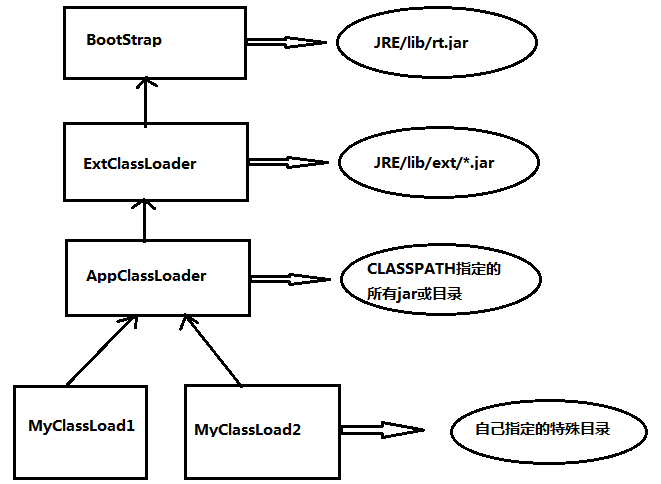JVM学习-ClassLoader的父类委托机制
2014-06-22 20:07
323 查看
1,什么是类加载器?
加载类的工具.
2,类加载器有什么作用?
当程序需要的某个类,那么需要通过类加载器把类的二进制加载到内存中.
类加载器也是Java类
3,类加载器之间的父子关系和管辖范围.

ClassLoader classLoader = ClassLoaderTest.class.getClassLoader();
while (classLoader != null) {
System.out.println(classLoader.getClass().getName());
classLoader = classLoader.getParent();
}
System.out.println(classLoader);

4,类加载器的委托机制:
1>当Java虚拟机要加载一个类时,到底派出哪个类加载器去加载呢?
①首先当前线程的类加载器去加载线程中的第一个类.
②如果类A中引用了类B,Java虚拟机将使用加载类A的类加载器加载类B
③还可以直接调用ClassLoader.loadClass()方法来指定某个类加载器去加载某个类.
2>每个类加载器加载类时,又先委托给其上级类加载器.
①当所有祖宗类加载器没有加载到类
,回到发起者类加载器,如果还加载不了,则抛出ClassNotFoundException异常,它不会 去找发起者类加载器的儿子,因为没有getChild()方法,即使有,有那么多的儿子交给那一个呢?所以干错就不叫给儿子处理了.
委托机制有什么好处?集中管理,如果我们写了几个类加载器,都去加载某个类,那么内存中就有多份这个类的字节码
能不能自己写一个类叫java.lang.System?
为了不让我们写System类,类加载采用委托机制,这样可以保证爸爸优先,也就是使用的永远是爸爸的(系统的)
System类,而不是我们写的System类.
5,编写自己的类加载器
public static void main(String[] args) throws Exception {
String srcPath = args[0];
String destDir = args[1];
FileInputStream fis = new FileInputStream(srcPath);
String destFileName = srcPath.substring(srcPath.lastIndexOf('\\')+1);
String destPath = destDir + "\\" + destFileName;
FileOutputStream fos = new FileOutputStream(destPath);
cypher(fis,fos);
fis.close();
fos.close();
}
/**
* 加密方法,同时也是解密方法
* @param ips
* @param ops
* @throws Exception
*/
private static void cypher(InputStream ips ,OutputStream ops) throws Exception{
int b = -1;
while((b=ips.read())!=-1){
ops.write(b ^ 0xff);//如果是1就变成0,如果是0就变成1
}
}
然后在新建一个类,通过上面的方法将新建的类的字节码进行加密:
public class ClassLoaderAttachment extends Date { //为什么要继承Date待会再说?
public String toString(){
return "hello,itcast";
}
}
并在工程里新建一个文件夹,用来保存加密后的class文件.

那么这就需要使用我们自己的类加载器来进行解密了.
public class MyClassLoader extends ClassLoader{
public static void main(String[] args) throws Exception {
String srcPath = args[0];
String destDir = args[1];
FileInputStream fis = new FileInputStream(srcPath);
String destFileName = srcPath.substring(srcPath.lastIndexOf('\\')+1);
String destPath = destDir + "\\" + destFileName;
FileOutputStream fos = new FileOutputStream(destPath);
cypher(fis,fos);
fis.close();
fos.close();
}
/**
* 加密方法,同时也是解密方法
* @param ips
* @param ops
* @throws Exception
*/
private static void cypher(InputStream ips ,OutputStream ops) throws Exception{
int b = -1;
while((b=ips.read())!=-1){
ops.write(b ^ 0xff);//如果是1就变成0,如果是0就变成1
}
}
private String classDir;
@Override
protected Class<?> findClass(String name) throws ClassNotFoundException {
String classFileName = classDir + "\\" + name.substring(name.lastIndexOf('.')+1) + ".class";
try {
FileInputStream fis = new FileInputStream(classFileName);
ByteArrayOutputStream bos = new ByteArrayOutputStream();
cypher(fis,bos);
fis.close();
System.out.println("aaa");
byte[] bytes = bos.toByteArray();
return defineClass(bytes, 0, bytes.length);
} catch (Exception e) {
e.printStackTrace();
}
return null;
}
public MyClassLoader(){
}
public MyClassLoader(String classDir){
this.classDir = classDir;
}
}
测试运行代码:
Class clazz = new MyClassLoader("myClass").loadClass("ClassLoaderAttachment");
//此处不能在使用ClassLoaderAttachment因为一旦用了之后,
//系统的类加载器就会去加载,导致失败,所以该类就继承了Date类了.
Date date = (Date)clazz.newInstance();
System.out.println(date);
运行结果:

6,一个类加载器的高级问题:
我们知道tomcat服务器,是一个大大的java程序,那么它就必须在JVM上运行.
这个大大的java程序内部也写了很多类加载器,它用这些类加载器去加载一些特定的类.注入servlet类.
下面我们新建一个javaweb工程,新建一个servlet程序.
public void doGet(HttpServletRequest request, HttpServletResponse response)
throws ServletException, IOException {
response.setContentType("text/html");
PrintWriter out = response.getWriter();
ClassLoader classload = this.getClass().getClassLoader();
while (classload != null) {
out.println(classload.getClass().getName()+"<br>");
classload = classload.getParent();
}
out.println();
out.close();
}
然后配置服务器,部署应用程序,启动tomcat服务器.在页面访问我们这个servlet,在页面打印的
结果如下图所示:

这是从小到大排序的.
现在呢?我想把该servlet打成jar包,放在ExtClassLoad类加载器加载的路径.
通过Eclipse即可完成

加载类的工具.
2,类加载器有什么作用?
当程序需要的某个类,那么需要通过类加载器把类的二进制加载到内存中.
类加载器也是Java类
3,类加载器之间的父子关系和管辖范围.

ClassLoader classLoader = ClassLoaderTest.class.getClassLoader();
while (classLoader != null) {
System.out.println(classLoader.getClass().getName());
classLoader = classLoader.getParent();
}
System.out.println(classLoader);

4,类加载器的委托机制:
1>当Java虚拟机要加载一个类时,到底派出哪个类加载器去加载呢?
①首先当前线程的类加载器去加载线程中的第一个类.
②如果类A中引用了类B,Java虚拟机将使用加载类A的类加载器加载类B
③还可以直接调用ClassLoader.loadClass()方法来指定某个类加载器去加载某个类.
2>每个类加载器加载类时,又先委托给其上级类加载器.
①当所有祖宗类加载器没有加载到类
,回到发起者类加载器,如果还加载不了,则抛出ClassNotFoundException异常,它不会 去找发起者类加载器的儿子,因为没有getChild()方法,即使有,有那么多的儿子交给那一个呢?所以干错就不叫给儿子处理了.
委托机制有什么好处?集中管理,如果我们写了几个类加载器,都去加载某个类,那么内存中就有多份这个类的字节码
能不能自己写一个类叫java.lang.System?
为了不让我们写System类,类加载采用委托机制,这样可以保证爸爸优先,也就是使用的永远是爸爸的(系统的)
System类,而不是我们写的System类.
5,编写自己的类加载器
public static void main(String[] args) throws Exception {
String srcPath = args[0];
String destDir = args[1];
FileInputStream fis = new FileInputStream(srcPath);
String destFileName = srcPath.substring(srcPath.lastIndexOf('\\')+1);
String destPath = destDir + "\\" + destFileName;
FileOutputStream fos = new FileOutputStream(destPath);
cypher(fis,fos);
fis.close();
fos.close();
}
/**
* 加密方法,同时也是解密方法
* @param ips
* @param ops
* @throws Exception
*/
private static void cypher(InputStream ips ,OutputStream ops) throws Exception{
int b = -1;
while((b=ips.read())!=-1){
ops.write(b ^ 0xff);//如果是1就变成0,如果是0就变成1
}
}
然后在新建一个类,通过上面的方法将新建的类的字节码进行加密:
public class ClassLoaderAttachment extends Date { //为什么要继承Date待会再说?
public String toString(){
return "hello,itcast";
}
}
并在工程里新建一个文件夹,用来保存加密后的class文件.

那么这就需要使用我们自己的类加载器来进行解密了.
public class MyClassLoader extends ClassLoader{
public static void main(String[] args) throws Exception {
String srcPath = args[0];
String destDir = args[1];
FileInputStream fis = new FileInputStream(srcPath);
String destFileName = srcPath.substring(srcPath.lastIndexOf('\\')+1);
String destPath = destDir + "\\" + destFileName;
FileOutputStream fos = new FileOutputStream(destPath);
cypher(fis,fos);
fis.close();
fos.close();
}
/**
* 加密方法,同时也是解密方法
* @param ips
* @param ops
* @throws Exception
*/
private static void cypher(InputStream ips ,OutputStream ops) throws Exception{
int b = -1;
while((b=ips.read())!=-1){
ops.write(b ^ 0xff);//如果是1就变成0,如果是0就变成1
}
}
private String classDir;
@Override
protected Class<?> findClass(String name) throws ClassNotFoundException {
String classFileName = classDir + "\\" + name.substring(name.lastIndexOf('.')+1) + ".class";
try {
FileInputStream fis = new FileInputStream(classFileName);
ByteArrayOutputStream bos = new ByteArrayOutputStream();
cypher(fis,bos);
fis.close();
System.out.println("aaa");
byte[] bytes = bos.toByteArray();
return defineClass(bytes, 0, bytes.length);
} catch (Exception e) {
e.printStackTrace();
}
return null;
}
public MyClassLoader(){
}
public MyClassLoader(String classDir){
this.classDir = classDir;
}
}
测试运行代码:
Class clazz = new MyClassLoader("myClass").loadClass("ClassLoaderAttachment");
//此处不能在使用ClassLoaderAttachment因为一旦用了之后,
//系统的类加载器就会去加载,导致失败,所以该类就继承了Date类了.
Date date = (Date)clazz.newInstance();
System.out.println(date);
运行结果:

6,一个类加载器的高级问题:
我们知道tomcat服务器,是一个大大的java程序,那么它就必须在JVM上运行.
这个大大的java程序内部也写了很多类加载器,它用这些类加载器去加载一些特定的类.注入servlet类.
下面我们新建一个javaweb工程,新建一个servlet程序.
public void doGet(HttpServletRequest request, HttpServletResponse response)
throws ServletException, IOException {
response.setContentType("text/html");
PrintWriter out = response.getWriter();
ClassLoader classload = this.getClass().getClassLoader();
while (classload != null) {
out.println(classload.getClass().getName()+"<br>");
classload = classload.getParent();
}
out.println();
out.close();
}
然后配置服务器,部署应用程序,启动tomcat服务器.在页面访问我们这个servlet,在页面打印的
结果如下图所示:

这是从小到大排序的.
现在呢?我想把该servlet打成jar包,放在ExtClassLoad类加载器加载的路径.
通过Eclipse即可完成

相关文章推荐
- java类加载器学习2——自定义类加载器和父类委托机制带来的问题/JAVA类加载的委托模型/Java的委托
- JVM学习之委托机制
- java类加载器学习2——自定义类加载器和父类委托机制带来的问题/JAVA类加载的委托模型/Java的委托
- Java类加载器学习2——自定义类加载器和父类委托机制带来的问题
- java类加载器学习2――自定义类加载器和父类委托机制带来的问题
- java类加载器学习2——自定义类加载器和父类委托机制带来的问题
- Java学习第一篇 Java程序运行机制和jvm
- JVM学习-ClassLoader
- JVM学习-ClassLoader
- 学习委托(3)-----解析委托的实现机制续篇
- JVM-3-JVM中的父委托机制-源码体现
- JVM学习笔记-引用(Reference)机制
- jvm内存JVM学习笔记-引用(Reference)机制
- 深入理解JVM学习笔记-自动内存管理机制
- 学习委托(2)-------解析委托的实现机制
- java之jvm学习笔记十二(访问控制器的栈校验机制)
- java虚拟机学习-慢慢琢磨JVM(2-1)ClassLoader的工作机制
- 黑马程序员-高新类加载器及委托机制学习日记 .
- 学习委托(3)-----解析委托的实现机制续篇
- JVM笔记7:类加载器与上级委托机制
